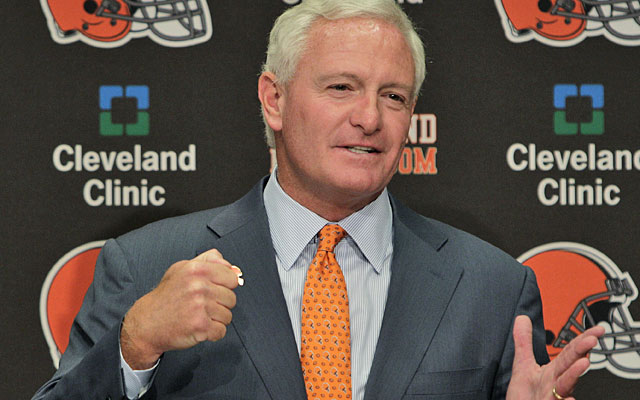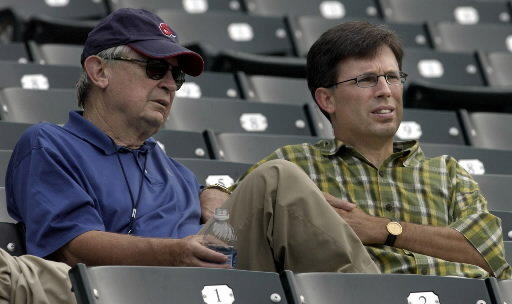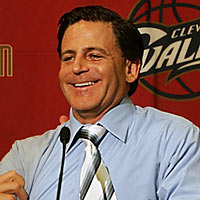 General
General  General Archive
General Archive  Lingering Items--Ownership Edition
Lingering Items--Ownership Edition
 There's no real playbook for how exactly one goes about the business of actually owning a professional sports team except, of course, the requirement that you have or have access to plenty of money. But once secured, the day to day job of owning a team is mostly a blank canvas. Jimmy Haslam, the now-conflicted owner of the Cleveland Browns, apparently is still early on in feeling his way through the process and fans here are worried.
There's no real playbook for how exactly one goes about the business of actually owning a professional sports team except, of course, the requirement that you have or have access to plenty of money. But once secured, the day to day job of owning a team is mostly a blank canvas. Jimmy Haslam, the now-conflicted owner of the Cleveland Browns, apparently is still early on in feeling his way through the process and fans here are worried.
As you'll recall Haslam gave up the CEO job at His Pilot Flying J truck stop empire in favor of doing whatever it is that owners of professional sports teams do. In the few months he's actually owned the Browns, that included quite a bit of activity. He finessed Mike Holmgren out of town, he fired a general manager and hired another, he fired a coach and hired another, he met with city leaders and then, for good measure, he secured a nice little annuity for his team by selling the naming rights to its stadium for a 20 year term. It was certainly more than 6 days of work.
But having crossed off those tasks from the mental list of "to dos" that he keeps, Haslam started to realize that there wasn't much left for him to do at the moment particularly if he was going to allow the people he hired to run his football business to actually do their jobs.
So Haslam decided to push out the executive he just hired from Pepsico to run Pilot Flying J by giving him a different role and took back his old job of CEO. It was kind of a ballsy move, actually, the kind we're not used to seeing here in Cleveland. Holmgren for example couldn't muster the courage to fire Eric Mangini and put himself in as head coach when that was all he really wanted to do. Indeed the Holmgren example is instructive.
One of the reasons Holmgren ended up being a lousy whatever the hell he was stemmed from his inability to see himself as anything other than a coach. He lacked the guts to take the job himself when that would have served both him and the fans far better than hiring Pat Shurmur. Holmgren thus dithered in a role he was ill suited to play, grew bored quickly and mailed in his job performance, figuratively and literally. In that sense and with that as a data point, maybe it is good that Haslam went back to what makes him happy.
But Haslam better become more sensitive to the fan base he serves. Fans here don't like finding out from the local newspaper in Knoxville, Tennessee that he's had a change of heart about how he spends his day. They wanted to hear it first hand and didn't. Haslam owed this courtesy to the Cleveland fans he expects to support his now hobby and not to the citizens of Knoxville who were just getting to know the new guy at Pilot Flying J.
As to the move itself, Haslam is adamant that nothing has changed regarding his commitment to the team, telling the Plain Dealer that "I don't think anyone would question our passion, effort, intensity or devotion to the Cleveland Browns and, candidly, to Northeast Ohio. Our family has a tremendous investment, and we want to win as bad as anybody does up there and we're going to do whatever it takes to win."
Not a bad rejoinder to those who would question his commitment but it would have been more effective if he had not referred to the fans as "anybody..up there." It probably would have been the opportune time to start referencing the collective "we" and not remind everyone that depending on the route you take, there's one possibly two states between where his team plays and where his real passion lies.
This is where we get into the whole "how exactly does one actually go about being an owner?" discussion.
In Cleveland the last two owners have had no other job beyond owning the team and I don't think anyone would hold either up as a model owner or a model for Haslam to emulate. Art Modell didn't adapt to the idle time well so he tinkered and tinkered with the team, convinced himself that he knew as much about football as anyone on the planet, and set in motion a decades long course of losing everything he built because of it. Randy Lerner on the other hand had an immense capacity for being bored perhaps the difference from Modell being the fact that at least Modell at one time in his life actually held a job. Lerner was like the Hugh Grant character in About a Boy, dividing each day into increments of frivolity in order to make his spectacularly inane existence manageable.
I suspect that most owners in the NFL have some outside business interests that keep them busy during the down days of the NFL, meaning mid February through mid July, but on the other hand Haslam is now one of the very few owners in the NFL who has a completely separate full time job as CEO of a pretty good sized company. That role requires him to satisfy a whole host of constituents, not the least of which are family members with sizeable stakes in said company. In other words, Haslam as CEO requires a fair amount of attention to that task.
Does that mean Haslam is destined to become another crappy owner of the Browns? Not necessarily but there is pause, isn't there? By default, Haslam won't assimilate very quickly if at all in the local community. In that regard, his "up there" comment is very telling. Then there is the elephant in the room that no one is talking about—the management team he put in place to run the Browns in his absence. Fans seem relatively sold on Joe Banner as, I guess, club president or whatever he's calling himself, but are less so on Mike Lombardi who, whatever his title might be, is the guy populating the team with free agents and draft picks.
Haslam as absentee-owner (and a house in Bratenhal that he says he'll occupy once or twice a week in season doesn't make him resident) could work but at the very least the jump he made back to the family business was too soon. Fans have not had an opportunity to get comfortable with the team Haslam put in place and given all of the other similar teams put in place before them there's a pretty good chance that fans will never get comfortable with them.
I think Haslam owed it to the fans to stay the course he set out, basically promised, when he became owner. It was a bit of a bait and switch and is now another reason for fans to think that this isn't going to work out any better than anything else that's been tried. The fans may not be right, indeed they usually aren't, but it's up to Haslam to prove them wrong and right now he hasn't made much of an effort to do that.
**
 Speaking of owners, the Cleveland Indians' Larry and Paul Dolan are putting together a nice little offseason for themselves. When they set out to rectify the chief criticism of them it should be noted. And so it is that the Dolans have pumped an additional $20+ million into the payroll and hired an actual, honest-to-gosh successful manager for this upcoming season in an effort to rebuild fan faith and recapture fan enthusiasm.
Speaking of owners, the Cleveland Indians' Larry and Paul Dolan are putting together a nice little offseason for themselves. When they set out to rectify the chief criticism of them it should be noted. And so it is that the Dolans have pumped an additional $20+ million into the payroll and hired an actual, honest-to-gosh successful manager for this upcoming season in an effort to rebuild fan faith and recapture fan enthusiasm.
For what it's worth, it's hard to tell really whether either of the Dolans are otherwise gainfully employed outside of their duties as owners. They have investments certainly and other businesses but neither are acting as CEOs of other on-going concerns. Has that helped or hurt the Indians, hard to say. But I think the fact that they live locally assuage any concerns about their commitment to the town or team. The concern with them has always been their financial wherewithal and their generally self-fulfilling prophesy way of running a team they purposely labeled small market so that they could justify running it in small market ways.
The Dolans haven't become the Steinbrenners but no one expected them to. But for the first time in years they have decided that reinvestment was needed, the growing number of empty seats around Progressive Field being a serious clue.
There's no way of knowing at the moment whether the Terry Francono, Michael Bourn or Nick Swisher moves will bear fruit except in the Cleveland-curse sort of way that we know nothing ever works out like it should. But rightful credit is due to the Dolans and to general manager Chris Antonetti for doing something. They had to. If the offseason had consisted simply of bringing in a washed up Jason Giambi and a weak armed Daisuke Matsuzaka, and we've had exactly those kinds of offseason in each of the last 10 years, then fans would have blown their brains out. To put a sharper point on it, fans would have stayed away in even bigger numbers than last season and the Dolans would find themselves struggling to meet the modest attendance totals of the Indians circa any year prior to the move to what is now Progressive Field.
At this point there isn't any question that the Indians are an improved team from the mess that was last season but just how improved is the real question. Perhaps the biggest question though is whether this is a one year cash infusion or part of a multi year plan to actually reinvest in the franchise and get it back to where it can actually compete.
Where the Dolans have failed the fans in the past has been in not building on a previous season's success. That they have finally reinvested in the team is great and is applauded but it must be part of an overall attitude change and not a one time event or the alienation from the fans they feared for this year will simply be delayed by a year.
**
 This all brings us to the last owner in town, Dan Gilbert. He's closest, perhaps, to the model that Haslam seems to be adopting. Gilbert is a Detroit person through and through but what he's done to overcome the perception as an out of towner has been to move some of his business operations to Cleveland. Jimmy, are you listening?
This all brings us to the last owner in town, Dan Gilbert. He's closest, perhaps, to the model that Haslam seems to be adopting. Gilbert is a Detroit person through and through but what he's done to overcome the perception as an out of towner has been to move some of his business operations to Cleveland. Jimmy, are you listening?
The other thing though is that Gilbert, in the various enterprises he has going including the new casino, is perhaps the most distracted owner in town. Has that negatively impacted the Cavaliers? Hard to say and the reason it's hard to say is that the NBA is by far the toughest league in which to build a team back up from the bottom.
The NBA's history is irrefutable at this point. Once a team sinks to the bottom it's at least a decade before it's competitive again and that's assuming competent management. You can try to accelerate the timetable but it's rarely been done. The salary cap and the draft lottery combine in a unique way to keep bad teams down for as long as possible. The Cavs seem on track in that regard.
The reason Gilbert seethed when LeBron James left had everything to do with the financial impact it would have on Gilbert's empire knowing this history. With James out of the mix, the Cavs overnight became a bottom tier team with all of the bottom tier perks that come with that status such as empty seats and decreasing revenues. If the Cavs were a stand alone enterprise that would be one thing. But the residual impact of those empty seats spills over to concessions and, more particularly, to a difficulty attracting casual gamblers to the Horseshoe Casino. A full Quickens Loan Arena for 40+ winter nights a year translates to a lot of lost money at the gaming tables and slots.
Would the Cavs be further along if Gilbert were focused entirely on the Cavs? Again, hard to say. Gilbert, like Haslam, believes in hiring professionals to run the business while providing oversight that hardly requires a 24/7 level of concentration. So Gilbert's success, like Haslam's, will depend fully on whether the general managers they have on hand are up to the challenge.
**
A popular question floating around this past week, given the Indians' moves, has been which local team is closest to the playoffs? The better question and this week's question to ponder is which local team is the furthest?
- NBA Announces 2013-2014 Schedule
- Browns Ink Sharknado
- Sharknado A No-Show For Rookie Camp
- Trent Richardson Out Until Training Camp
- Browns Sign Brandon Jackson
- Carrasco Suspended Eight Games
- Browns Add to Wide Receiver Depth with David Nelson
- Browns Need to Learn from Past Draft Mistakes
- Browns Release Chris Gocong and Usama Young
- Browns Missing on Grimes Disappointing, But Not The End
The TCF Forums
- Movies coming out
rebelwithoutaclue (Tuesday, January 21 2014 12:56 PM) - 2015 Recruiting
jclvd_23 (Tuesday, January 21 2014 12:38 PM) - The 2014 Offseason Thread
Larvell Blanks (Tuesday, January 21 2014 12:25 PM) - Official- Browns Coach Search/Rumors
Larvell Blanks (Tuesday, January 21 2014 11:53 AM) - Chris Grant's first 3 drafts
Kingpin74 (Tuesday, January 21 2014 10:13 AM) - Mike Brown
YahooFanChicago (Monday, January 20 2014 11:15 PM) - 2014 Hoops Hockey Hijinx
jpd1224 (Monday, January 20 2014 4:44 PM) - 2014 Recruiting
jclvd_23 (Monday, January 20 2014 2:26 PM) - Wish List - #4 Pick
Hikohadon (Monday, January 20 2014 1:26 PM) - #1 overall pick Anthony Bennett
TouchEmAllTime (Sunday, January 19 2014 1:28 PM)


